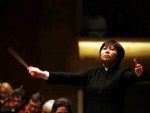Title
Since her prior appearances with the Juilliard Orchestra—including the April 30 premiere of Augusta Reade Thomas’s Jubilee and on its 2008 tour of China—Chinese-American conductor Xian Zhang has had many reasons for celebration. In addition to making her debuts at La Fenice and the Royal Concertgebouw, she has become music director of the Orchestra Sinfonica di Milano Giuseppe Verdi, making history as the first woman to lead an Italian orchestra. This December, she eagerly marks her return to Juilliard with a program that runs the gamut of German repertoire.
Body
She begins with the newest work, Anton Webern’s 1908 Passacaglia, Op. 1. Though it’s considerably more opulent than the sparse miniatures of the composer’s later career, the Passacaglia bears the mark of his studies with Schoenberg, which had concluded just prior to its composition. Though the work is performed frequently enough not to qualify as a true oddity, in a recent conversation with The Journal, the 37-year-old conductor called the Passacaglia “a really rare piece.” Webern’s contribution to the genre of bass-based variations is true to its models and clearly indicates his ongoing fascination with old forms and techniques.
The program’s language changes dramatically with Mozart’s Sinfonia Concertante for Violin and Viola, K. 364. The hybrid genre of symphony and concerto was popular in 18th-century Paris, so it should come as little surprise that Mozart composed it following an extended stay in France. It ranks among his most charming and touching scores, and has been a favorite among performers and audiences for generations.
The program concludes with a piece created chronologically almost exactly between the two preceding works. Robert Schumann’s hotly contested Fourth Symphony may have the distinction of being the only major work of its type to have had three premieres. Dissatisfied with the work after its 1841 premiere (as his Second Symphony and under his own direction), Schumann revised it substantially and presented it again 10 years later in 1851 as his Op. 120, giving the honor of the new premiere to his friend Felix Mendelssohn.
Both Schumann and his wife, Clara, vastly preferred the later version of the symphony, but Johannes Brahms, their close friend, preferred the early version and after Robert’s death presided over its publication despite Clara’s objections. Thus, two performing versions became available.
It required yet another great musical mind to make some sense of the matter. Gustav Mahler, equally renowned during his life as a conductor and composer, seemed to share the Schumanns’ assessment of the symphony: When programming his concerts with the Vienna Philharmonic, he used the later version of the score. Yet sensitive to some of the challenges presented even by Schumann’s arguably more refined effort, Mahler made the decision to create a third version.
This was not Mahler’s first essay in “fixing” or otherwise altering a work by an established master. During his career as a conductor, he prepared similar editions of all the Schumann symphonies, Beethoven’s Ninth Symphony, and a number of Beethoven’s string quartets, which he arranged for string orchestra. The Mahler edition of Schumann’s Fourth Symphony was premiered in 1900, and his improvements were not without controversy.
Still, many conductors prefer Mahler’s version, and Zhang is among them. “I did comparisons between the original and I noticed many things Mahler did ... to make it better and easier for the musicians to execute,” she said. “I really appreciate Mahler’s mastery of being a conductor and interpreter. I think he enhanced the piece and made it more transparent. In doing that, he makes the music even more Schumann. I used to do the original version, but having conducted this one, I would never go back.”
After serving for the better part of a decade in apprenticeship and guest positions, Zhang is finally hitting her stride as a major conductor, though she still feels the sting of the struggle and commiserates with the young conductors at Juilliard. “I completely appreciate and understand how difficult it is to learn conducting. It’s almost impossible,” she said. “To think that you must learn everything in the score prior to even touching the instrument; it’s almost like you’re playing in front of a hundred people without ever practicing!”
Another challenge Zhang has confronted has been the fact that not every country has achieved the same gender equality that she enjoyed in China. “Sometimes I feel this extra pressure because people have not seen so many women conductors and in a sense, I must do very well to prove to those who don’t believe that women can conduct that they are wrong,” she said. She recalled an enthusiastic Austrian woman, who after a concert in Bregenz said that Zhang was the first woman she had ever seen on the podium. “At moments like that, I just want to laugh, but I feel very good about it, because sooner or later they are going to have to get used to it. At this moment, though, I’m still quite a rarity, and I realize that.”
Younger musicians “have such an enthusiasm about making music that’s really wonderful to feel,” Zhang said. “Most professional orchestras are so used to it; they do concerts like this every day. With younger musicians there’s this excitement that I enjoy very much.





